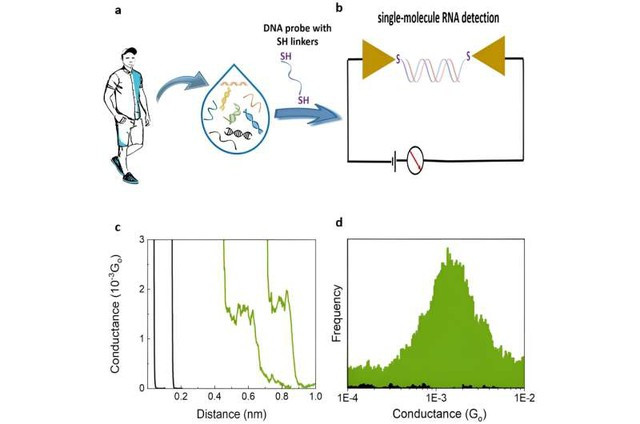RNA molecular biomarkers help detect many types of cancer early
In a new breakthrough, scientists have investigated the electrical detection of RNA cancer biomarkers in liquid biopsies. This cancer marker promises to contribute to early cancer screening, preventing cancer deaths.
Early screening methods hold promise for reducing cancer mortality, particularly through the analysis of biomarkers in liquid biopsies. Biologists have shown how the electrical detection of nucleic acids at the single-molecule level could facilitate such applications.
In a new paper published in the scientific journal Scientific Reports, Keshani G. Gunasinghe and a team of chemists at the University of Massachusetts, USA, investigated the potential of electrochemical detection of RNA cancer biomarkers for cancer screening devices.

The sequence-sensitive conductance of the device allows for the discrimination of mutants. The specificity of the biosensor for a single molecule has a high signal-to-noise ratio. The results pave the way for the development of miniaturized single-molecule bioelectronic sensors that could revolutionize cancer screening.
The World Health Organization (WHO) lists cancer as the leading cause of death. Cancer deaths can be prevented through early detection and treatment of cancer.
Early detection of cancer could be possible through non-invasive analysis of liquid biopsy samples.
Liquid biopsies target cancer-specific biomarkers in blood or saliva that include tumor cells or tumor nucleic acids such as tumor DNA and RNA variants—ctDNA and ctRNA.
Normally, it is difficult to detect ct-nucleic acid (ctNA) in liquid biopsy due to its low concentration and low mutation frequency. However, bioengineers have applied nanotechnology with the STMBJ technique, which has recently been used to detect the first single molecule with high sensitivity.
Genomic studies of cancer biomarkers including the Whole Cancer Genome Analysis Project, the International Cancer Genome Consortium, and the Cancer Genome Atlas have collected whole-genome cancer data from several tumor types.
This allowed scientists to identify potential mutation sequences for RNA cancer biomarkers observed in liquid biopsy samples. For example, KRAS sarcoma is a well-known oncogene with a high mutation rate in several common cancers, such as pancreatic adenocarcinoma, colorectal cancer, and melanoma.
Cancer-causing gene mutations commonly associated with codon 12 mutations are present in 46% of lung adenocarcinomas, known as G12, while this mutation is present in many colorectal and pancreatic cancers. The team focused on two specific mutations that span a wide range of cancers with promising future screening methods.



.jpg)





